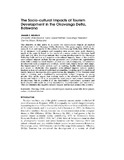The socio-cultural impacts of tourism development in the Okavango Delta, Botswana
Date
2004Author
Mbaiwa, J.E.
Publisher
Channel view publications, http://www.multilingual-matters.net/jtc/default.htmType
Published ArticleMetadata
Show full item recordAbstract
The objective of this article is to assess the socio-cultural impacts of tourism
development in the Okavango Delta, Botswana. This paper largely relied on the
research work and reports by the author in the Okavango Delta from 1998 to 2004.
In all instances, both primary and secondary data sources were used. However,
much of the paper is based on the results of a survey carried out between April
2001 and July 2002. Findings indicate that tourism development in the Okavango
Delta has both positive and negative socio-cultural impacts. Some of the positive
socio-cultural impacts include income generation and employment opportunities
from both community-based tourism projects and safari companies, infrastructure
development such as airport and airstrips, tarred roads, hotels, lodges and camps,
the improvement of social services such as banking, health, telecommunications
and access to electricity. The negative socio-cultural impacts include enclave
tourism, racism, relocation of traditional communities, breaking up of the traditional
family structure, increase in crime, prostitution, the adoption of the Western safari
style of dressing and a traditionally unacceptable ‘vulgar’ language by young
people. This article argues that tourism needs to be sensitive to local cultural
norms and beliefs for it to be accepted by local people and promote sustainable
development. This is possible if all the stakeholders (government, operators and
local people) collaborate in policy formulation, implementation and monitoring.
This can minimise the negative cultural impacts and instead promote the positive.

